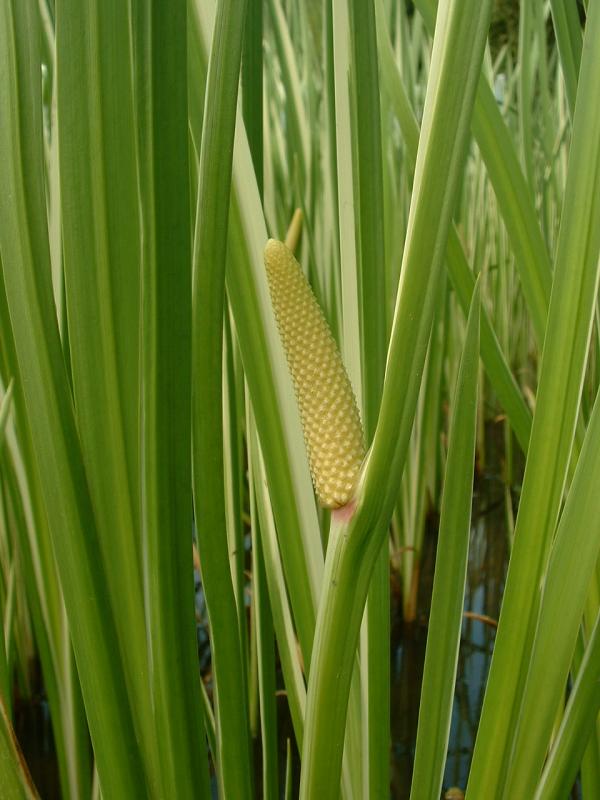 Sweet flag (Acorus calamus) is a wetland grass-like monocotyledon plant of the Acoraceae family. Sweet flag can be found growing in northern and subtropical regions, particularly in parts of Europe, Asia, Russia and North America. Sweet flag can grow to up to 100 cm tall in tufts of leaves that spread from a central creeping rhizome. The tufts also give rise to tall flower stems which flower in spring and summer. The rhizomes of the plant contain α- and β-asarone and these may provide mood elevating effects. For example, in one study researchers investigated the mood elevating effects of sweet flag extracts on subjects with generalised anxiety disorder. Subjects received 500 mg per day of Acorus calamus extract twice daily for up to 60 days. The researchers reported that the subject experienced significant reduction in their anxiety as measured by the Hamilton’s Brief Psychiatric Rating Scale and clinical examination. Therefore sweet flag may have therapeutic use as an anxiolytic agent in human subjects.
Sweet flag (Acorus calamus) is a wetland grass-like monocotyledon plant of the Acoraceae family. Sweet flag can be found growing in northern and subtropical regions, particularly in parts of Europe, Asia, Russia and North America. Sweet flag can grow to up to 100 cm tall in tufts of leaves that spread from a central creeping rhizome. The tufts also give rise to tall flower stems which flower in spring and summer. The rhizomes of the plant contain α- and β-asarone and these may provide mood elevating effects. For example, in one study researchers investigated the mood elevating effects of sweet flag extracts on subjects with generalised anxiety disorder. Subjects received 500 mg per day of Acorus calamus extract twice daily for up to 60 days. The researchers reported that the subject experienced significant reduction in their anxiety as measured by the Hamilton’s Brief Psychiatric Rating Scale and clinical examination. Therefore sweet flag may have therapeutic use as an anxiolytic agent in human subjects.
In addition, the Acorus calamus extract also significantly reduced the stress of the subjects and the depression that is associated with stress. Therefore as well as an anxiolytic effects Acorus calamus may have anti-stress and antidepressant effects. Other studies have also observed significant reductions in depression with administration of Acorus calamus extracts to human subjects. The antidepressant effects of Acorus calamus may derive from the ability of the herb to alter the electrical activity in the brain, and its ability to increase monoamine levels in the brain. In rats, Acorus calamus extracts have been shown to modify levels of noradrenaline, dopamine and serotonin, in different parts of the brain, with some regions experiencing increases, and some decreases. Further, the alpha brain wave activity in the brain also increased. These results are consistent with activation of the GABA receptors in the brains of the rats. Activation of GABA receptors would be expected to modify monoamine release and increase an alpha wave state.

A number of bioactive phytochemicals have been isolated from sweet flag, including asarones, shyobunones, acorones, octanoic acid, α-cedrene, α-phellandrene, β-farnesene and γ-elemene. These phytochemicals may be responsible for the mood elevating effects of sweet flag. Sweet flag rhizome has been shown to contain 1.8 to 9.3 % of a volatile oil composed of monoterpenes, sesquiterpenes, and phenylpropanoids. Researcher have shown that a number of sesquiterpenes from sweet flag and the chemical β-asarone can bind to the GABAA receptors. As GABA receptors are involved in producing anxiolytic effects in animals, this may be the mechanism by which sweet flag is able to exert its mood elevating effects. Image is of sweet flag (Acorus calamus). Image from: By J.F. Gaffard, Autoreille, France (photo J.F. Gaffard, Autoreille, France, mai 2004,) [GFDL (http://www.gnu.org/ copyleft/ fdl.html), CC-BY-SA-3.0 (http://creativecommons.org/ licenses/by-sa/ 3.0/) or CC BY-SA 1.0 (https:// creativecommons.org/ licenses/ by-sa/1.0)], via Wikimedia Commons.
Acorus calamus extracts may also have sedative effects, and it has been suggested that the α- and β-asarone may be responsible for these effects. Evidence also suggests that Acorus calamus may have memory enhancing effects, and in this regard may inhibit the enzyme acetylcholinesterase, thereby increasing brain levels of acetylcholine. The anxiolytic effects of α-asarone from Acorus gramineus has been investigated in rats. Rat were administered different concentrations of α-asarone prior to exposure of the rats to stressful conditions. The extract of α-asarone significantly decreased the anxious behaviour of the rats, suggesting that this compound may be responsible for the anxiolytic effects of plants which contain it, including Acorus calamus. Stress hormone release is known to cause an upregulation of tyrosine hydroxylase which subsequently increase brain production of noradrenaline and dopamine. Extracts of α-asarone have been shown to attenuate these stress induced changes to tyrosine hydroxylase.
Eat Well, Stay Healthy, Protect Yourself
RdB
